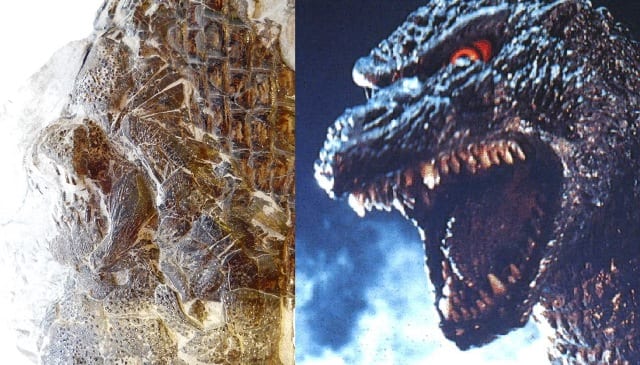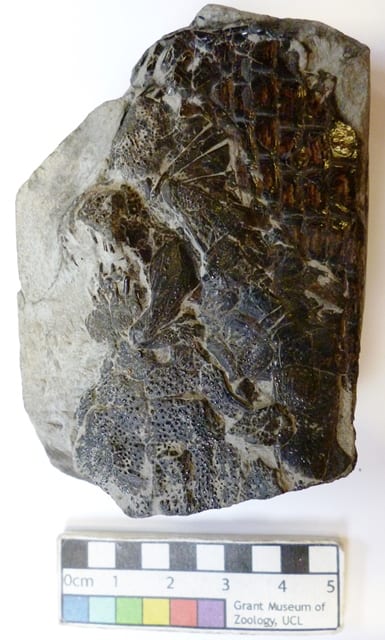Underwhelming Fossil Fish of the Month: May 2014
By Mark Carnall, on 30 May 2014
It’s been a full year since this monthly blog series, exploring the uninspiring and underwhelming fossil fish in the Grant Museum’s collection, featured what scientists call a ‘pretty boy’ specimen. Back in April last year, I featured this astonishingly handsome specimen that kicked up a media storm. The museum was inundated with flowers and fan mail being sent in (please don’t send live flowers to the museum they are an integrated pest management nightmare). I anticipate that this month’s fossil fish will also set hearts a fluttering. I recommend that those of you susceptible to swooning and screaming uncontrollably at a beautiful fossil prepare yourselves accordingly. Once more unto the breach, dear friends!
LOOK AT THE MOUTHPARTS ON THIS!
I warned you didn’t I? What a cracking fossil. This specimen has been identified as a part of the mouth and scales of a fish in the genus Dapedium. Dapedium is a genus of extinct ray-finned fish (fins not shown here). Dapedium was first described from some very whelming indeed whole body fossils from world famous Jurassic Coast locality, Lyme Regis in Dorset and according to the museum label on this specimen, it too was collected from the Blue Lias, Lyme. Blue Lias is the name of a geological formation so we can date this fossil to around 200 million years old. Beautiful Dapedium fossils have been found in Triassic and Jurassic rocks from all over Northern Europe but sadly they went extinct in the Jurassic (unless this antiques dealer is to be believed in which case at least one fish carried on the line until 150 years BC). Fortunately for us they remain preserved as lovely fossils like this one.
From whole body fossil of Dapedium we know quite a bit about these fish. What this fossil shows very nicely and perhaps the reason why it was collected is that these fish had skulls armoured with bony plates and the upper jaw could be protruded to catch fish, not quite in the middlemouth-style of a Xenomorph from the Alien films (or indeed some living species of fish) but cool nonetheless. This fossil shows the upper and lower jaw exquisitely preserved in three dimensions SEGUE TO THE NEXT SECTION.
Preservation I don’t need to tell you but this fossil is beautifully preserved and has been nicely prepared (edges as smooth as silk). It’s quite hard to work out exactly what we’re looking at. There’s the parts of the jaw complete with peg like teeth and paired bones of the skull roof. So this fossil is the top of the skull looking down. To me it looks like there are two fossils here, the scales shown on the right are a different fossil, or perhaps part of the same individual that is folded underneath the skull. The armoured bony plates of the skull are covered in small spherical studs, reminding me of studded leather armour that according to a new theory I’ve come up with in this sentence perhaps Dapedium was the inspiration for. Dapedium fossils like this one are often well preserved because the scales were covered in ganoine a hard enamel like susbtance that, amazingly, is preserved here as a thin layer coating the scales. Another important taphonomic point to note is that this fossil looks very much like Godzilla. If only there had been a recent Godzilla movie I could have tenuously tied this blog post into. I could have got a few more hits that way…

Uncanny isn’t it? On the left we have the beast, the legend, the scourge of Tokyo GODZILLA! On the right we have ahem… LDUCZ-V1508 Dapedium sp.
Research Given that this relatively common and often well preserved genus is a fossil fish you’re likely to see in any good UK museum display, I was genuinely a bit shocked to find that Dapedium, like many other fossil fish that are featured here is very much an ‘also ran’ taxon. After a quick literature search, Dapedium, where it is mentioned is often only mentioned once in a sentence along the lines of- ‘similar to the Jurassic Dapedium‘. Very dissappointing. One might even say underwhelming. It also goes to show that looks aren’t everything.
In Society According to ‘Keith’ in a comment on this excellently titled press release from the Lyme Regis Museum, Mary Anning, she of shea shell shelling fame and perhaps the original trowelblazer may have found the first ever Dapedium fossil. If only there had been a recent series of Mary Anning celebrations I could have tenuously tied this blog post into. I could have got a few more hits that way…
Dapedium sp.
Preservation 8
Research 1.5
In Society 0.7
Underwhelmingness 6
Mark Carnall is the Curator of the Grant Museum of Zoology
3 Responses to “Underwhelming Fossil Fish of the Month: May 2014”
- 1
-
2
Isabelle Lundqvist wrote on 29 June 2014:
Really looking forward to Junes Underwhelming Fossil Fish, what a great way to kick off the summer holidays!
-
3
Underwhelming Fossil Fish of the Month: June 2014 | UCL UCL Museums & Collections Blog wrote on 30 June 2014:

[…] specimen. The sound of anticipation is absolute silence (is it still a sound?). Some of the recent entries have been labelled in the national press* as ‘slightly whelming’ and ‘not as bad […]
 Close
Close




Dear oh dear oh dear…. you’ve shown the fish UPSIDE DOWN.
Tut tut. UCL academic standards! Did you see the rankings in the Grauniad? No wonder….